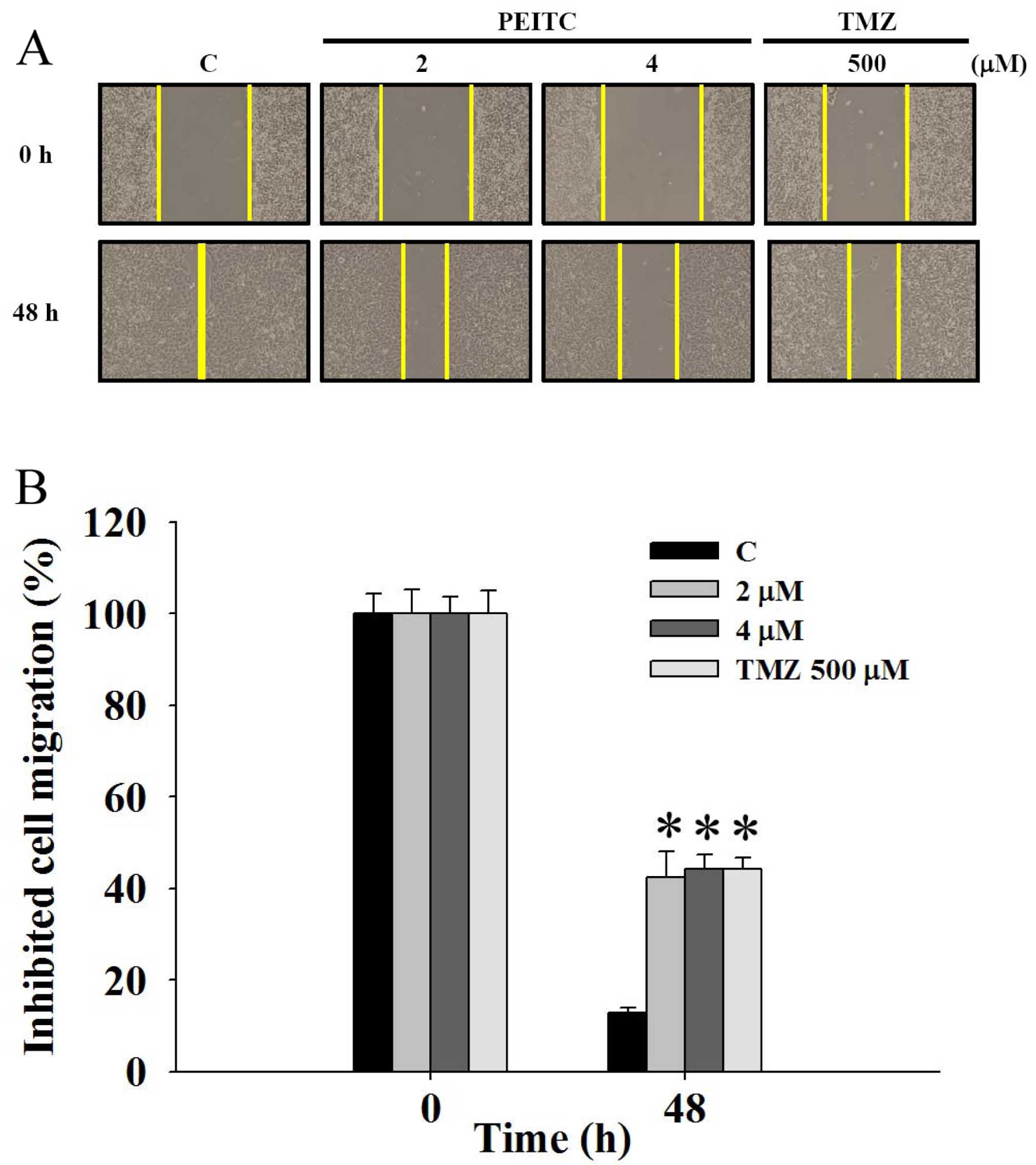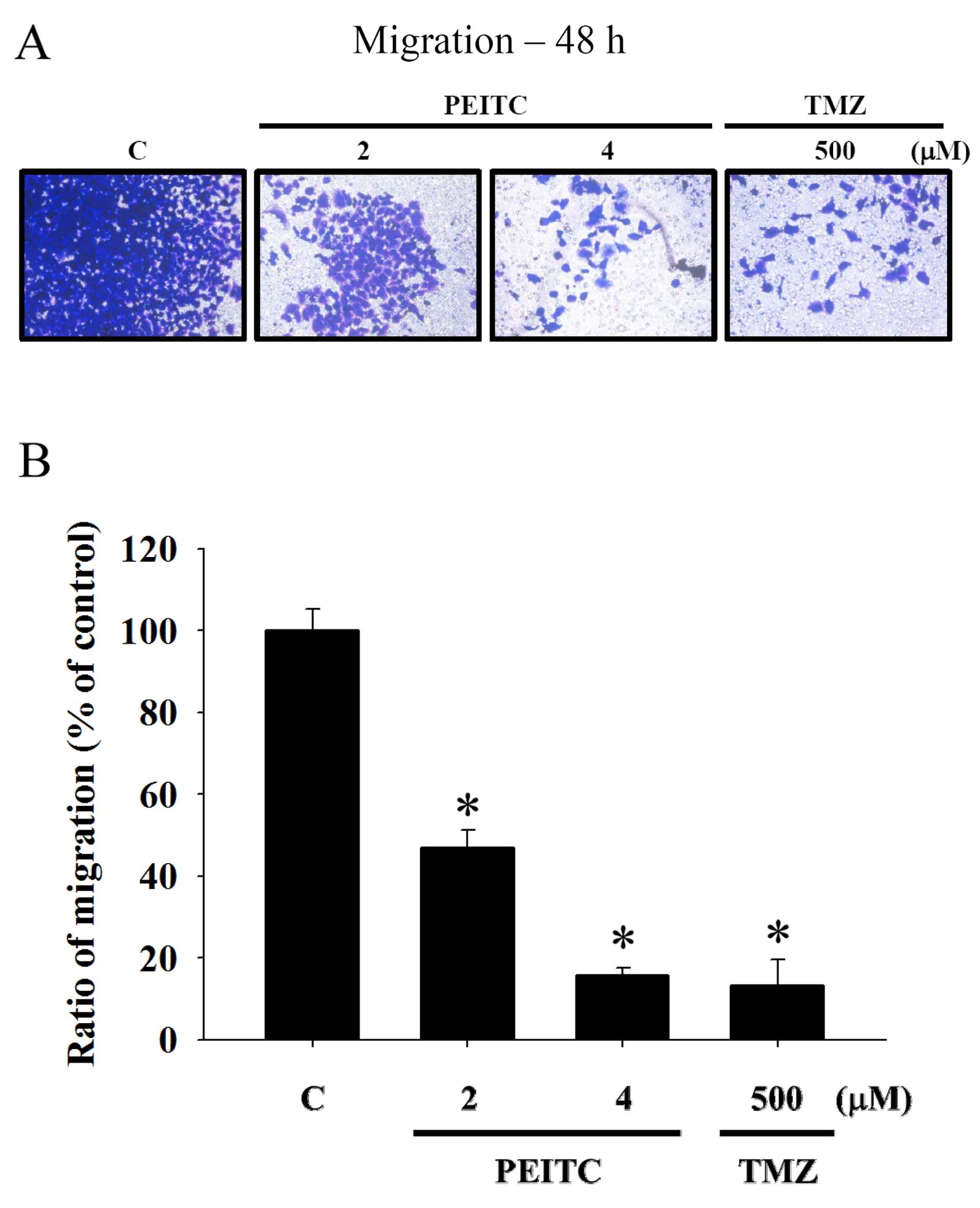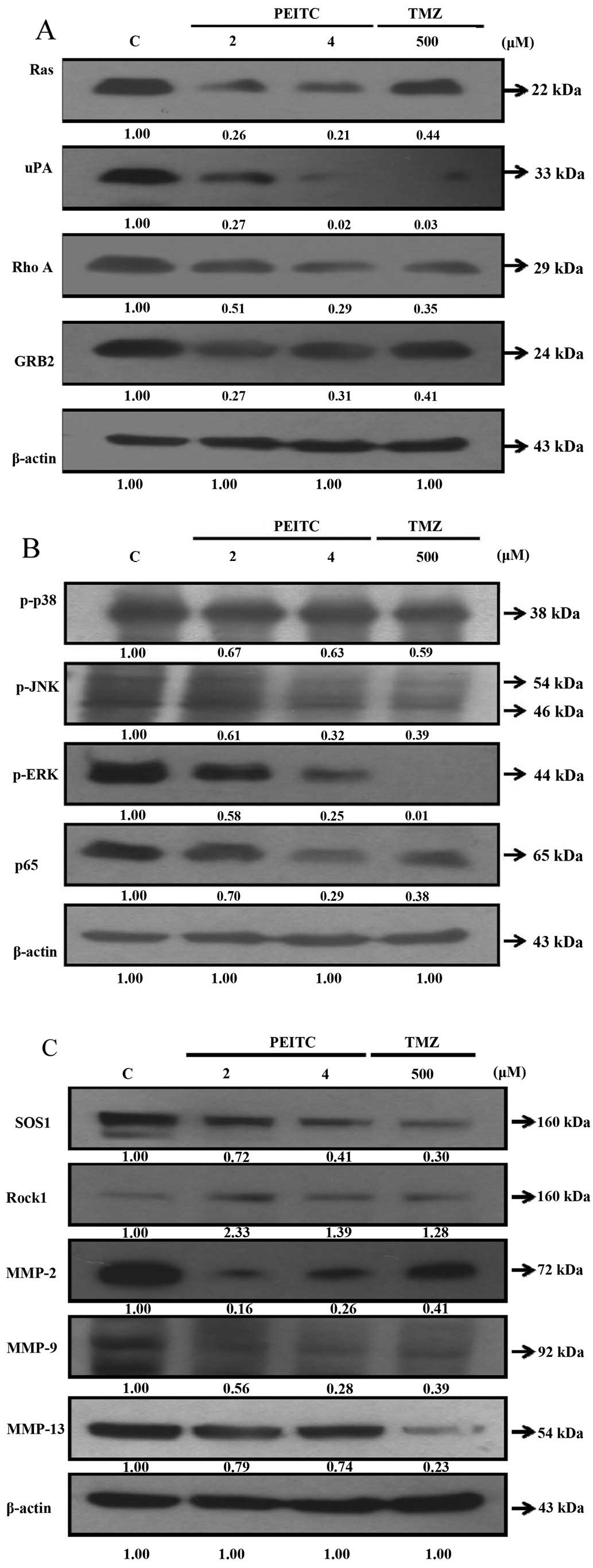|
1
|
Stupp R, Mason WP, van den Bent MJ, et al
European Organisation for Research and Treatment of Cancer Brain
Tumor and Radiotherapy Groups; National Cancer Institute of Canada
Clinical Trials Group: Radiotherapy plus concomitant and adjuvant
temozolomide for glioblastoma. N Engl J Med. 352:987–996. 2005.
View Article : Google Scholar : PubMed/NCBI
|
|
2
|
Lun M, Lok E, Gautam S, Wu E and Wong ET:
The natural history of extracranial metastasis from glioblastoma
multiforme. J Neurooncol. 105:261–273. 2011. View Article : Google Scholar : PubMed/NCBI
|
|
3
|
Yang LJ, Zhou CF and Lin ZX: Temozolomide
and radiotherapy for newly diagnosed glioblastoma multiforme: A
systematic review. Cancer Invest. 32:31–36. 2014. View Article : Google Scholar
|
|
4
|
Chaichana KL, Jusue-Torres I,
Navarro-Ramirez R, Raza SM, Pascual-Gallego M, Ibrahim A,
Hernandez-Hermann M, Gomez L, Ye X, Weingart JD, et al:
Establishing percent resection and residual volume thresholds
affecting survival and recurrence for patients with newly diagnosed
intracranial glioblastoma. Neurooncol. 16:113–122. 2014.
|
|
5
|
Moon YJ, Brazeau DA and Morris ME: Dietary
phenethyl isothiocyanate alters gene expression in human breast
cancer cells. Evid Based Complement Alternat Med. 2011(462525)2011,
http://dx.doi.org/10.1155/2011/462525.
|
|
6
|
Antosiewicz J, Ziolkowski W, Kar S,
Powolny AA and Singh SV: Role of reactive oxygen intermediates in
cellular responses to dietary cancer chemopreventive agents. Planta
Med. 74:1570–1579. 2008. View Article : Google Scholar : PubMed/NCBI
|
|
7
|
Chen YR, Han J, Kori R, Kong AN and Tan
TH: Phenylethyl isothiocyanate induces apoptotic signaling via
suppressing phosphatase activity against c-Jun N-terminal kinase. J
Biol Chem. 277:39334–39342. 2002. View Article : Google Scholar : PubMed/NCBI
|
|
8
|
Hu R, Kim BR, Chen C, Hebbar V and Kong
AN: The roles of JNK and apoptotic signaling pathways in
PEITC-mediated responses in human HT-29 colon adenocarcinoma cells.
Carcinogenesis. 24:1361–1367. 2003. View Article : Google Scholar : PubMed/NCBI
|
|
9
|
Jakubikova J, Bao Y and Sedlak J:
Isothiocyanates induce cell cycle arrest, apoptosis and
mitochondrial potential depolarization in HL-60 and
multidrug-resistant cell lines. Anticancer Res. 25:3375–3386.
2005.PubMed/NCBI
|
|
10
|
Kang L and Wang ZY: Breast cancer cell
growth inhibition by phenethyl isothiocyanate is associated with
down-regulation of oestrogen receptor-alpha36. J Cell Mol Med.
14:1485–1493. 2010. View Article : Google Scholar :
|
|
11
|
Telang U, Brazeau DA and Morris ME:
Comparison of the effects of phenethyl isothiocyanate and
sulforaphane on gene expression in breast cancer and normal mammary
epithelial cells. Exp Biol Med (Maywood). 234:287–295. 2009.
View Article : Google Scholar
|
|
12
|
Tseng E, Scott-Ramsay EA and Morris ME:
Dietary organic isothiocyanates are cytotoxic in human breast
cancer MCF-7 and mammary epithelial MCF-12A cell lines. Exp Biol
Med (Maywood). 229:835–842. 2004.
|
|
13
|
Chou YC, Chang MY, Wang MJ, Harnod T, Hung
CH, Lee HT, Shen CC and Chung JG: PEITC induces apoptosis of human
brain glioblastoma GBM8401 cells through the extrinsic- and
intrinsic -signaling pathways. Neurochem Int. 81:32–40. 2015.
View Article : Google Scholar : PubMed/NCBI
|
|
14
|
Gupta P, Adkins C, Lockman P and
Srivastava SK: Metastasis of breast tumor cells to brain is
suppressed by phenethyl isothiocyanate in a novel in vivo
metastasis model. PLoS One. 8:e672782013. View Article : Google Scholar :
|
|
15
|
Lai KC, Hsu SC, Kuo CL, Ip SW, Yang JS,
Hsu YM, Huang HY, Wu SH and Chung JG: Phenethyl isothiocyanate
inhibited tumor migration and invasion via suppressing multiple
signal transduction pathways in human colon cancer HT29 cells. J
Agric Food Chem. 58:11148–11155. 2010. View Article : Google Scholar : PubMed/NCBI
|
|
16
|
Lin CC, Chen JT, Yang JS, Lu HF, Hsu SC,
Tan TW, Lin YT, Ma YS, Ip SW, Wu JJ, et al: Danthron inhibits the
migration and invasion of human brain glioblastoma multiforme cells
through the inhibition of mRNA expression of focal adhesion kinase,
Rho kinases-1 and metalloproteinase-9. Oncol Rep. 22:1033–1037.
2009.PubMed/NCBI
|
|
17
|
Lu HF, Lai TY, Hsia TC, Tang YJ, Yang JS,
Chiang JH, Lu CC, Liu CM, Wang HL and Chung JG: Danthron induces
DNA damage and inhibits DNA repair gene expressions in GBM 8401
human brain glioblastoma multiforms cells. Neurochem Res.
35:1105–1110. 2010. View Article : Google Scholar : PubMed/NCBI
|
|
18
|
Shang HS, Chang JB, Lin JH, Lin JP, Hsu
SC, Liu CM, Liu JY, Wu PP, Lu HF, Au MK, et al: Deguelin inhibits
the migration and invasion of U-2 OS human osteosarcoma cells via
the inhibition of matrix metalloproteinase-2/-9 in vitro.
Molecules. 19:16588–16608. 2014. View Article : Google Scholar : PubMed/NCBI
|
|
19
|
Lu KW, Chen JC, Lai TY, Yang JS, Weng SW,
Ma YS, Lu PJ, Weng JR, Chueh FS, Wood WG, et al: Gypenosides
inhibits migration and invasion of human oral cancer SAS cells
through the inhibition of matrix metalloproteinase-2 -9 and
urokinase-plasminogen by ERK1/2 and NF-kappa B signaling pathways.
Hum Exp Toxicol. 30:406–415. 2011. View Article : Google Scholar
|
|
20
|
Liao CL, Lai KC, Huang AC, Yang JS, Lin
JJ, Wu SH, Gibson Wood W, Lin JG and Chung JG: Gallic acid inhibits
migration and invasion in human osteosarcoma U-2 OS cells through
suppressing the matrix metalloproteinase-2/-9, protein kinase B
(PKB) and PKC signaling pathways. Food Chem Toxicol. 50:1734–1740.
2012. View Article : Google Scholar : PubMed/NCBI
|
|
21
|
Ho CC, Huang AC, Yu CS, Lien JC, Wu SH,
Huang YP, Huang HY, Kuo JH, Liao WY, Yang JS, et al: Ellagic acid
induces apoptosis in TSGH8301 human bladder cancer cells through
the endoplasmic reticulum stress- and mitochondria-dependent
signaling pathways. Environ Toxicol. 29:1262–1274. 2014.
|
|
22
|
Lin HJ, Su CC, Lu HF, Yang JS, Hsu SC, Ip
SW, Wu JJ, Li YC, Ho CC, Wu CC, et al: Curcumin blocks migration
and invasion of mouse-rat hybrid retina ganglion cells (N18)
through the inhibition of MMP-2, -9, FAK, RhoA and Rock-1 gene
expression. Oncol Rep. 23:665–670. 2010.PubMed/NCBI
|
|
23
|
Gupta B, Chiang L, Chae K and Lee DH:
Phenethyl isothiocyanate inhibits hypoxia-induced accumulation of
HIF-1α and VEGF expression in human glioma cells. Food Chem.
141:1841–1846. 2013. View Article : Google Scholar : PubMed/NCBI
|
|
24
|
Lee DH, Kim DW, Lee HC, Lee JH and Lee TH:
Phenethyl isothiocyanate sensitizes glioma cells to TRAIL-induced
apoptosis. Biochem Biophys Res Commun. 446:815–821. 2014.
View Article : Google Scholar : PubMed/NCBI
|
|
25
|
Kim YS and Joh TH: Matrix
metalloproteinases, new insights into the understanding of
neurodegenerative disorders. Biomol Ther (Seoul). 20:133–143. 2012.
View Article : Google Scholar
|
|
26
|
Chintala SK, Tonn JC and Rao JS: Matrix
metalloproteinases and their biological function in human gliomas.
Int J Dev Neurosci. 17:495–502. 1999. View Article : Google Scholar : PubMed/NCBI
|
|
27
|
Inoue A, Takahashi H, Harada H, Kohno S,
Ohue S, Kobayashi K, Yano H, Tanaka J and Ohnishi T: Cancer
stem-like cells of glioblastoma characteristically express MMP-13
and display highly invasive activity. Int J Oncol. 37:1121–1131.
2010.PubMed/NCBI
|
|
28
|
Zhao Y, Lyons CE Jr, Xiao A, Templeton DJ,
Sang QA, Brew K and Hussaini IM: Urokinase directly activates
matrix metallo-proteinases-9: A potential role in glioblastoma
invasion. Biochem Biophys Res Commun. 369:1215–1220. 2008.
View Article : Google Scholar : PubMed/NCBI
|
|
29
|
Ruiz-Ontañon P, Orgaz JL, Aldaz B,
Elosegui-Artola A, Martino J, Berciano MT, Montero JA, Grande L,
Nogueira L, Diaz-Moralli S, et al: Cellular plasticity confers
migratory and invasive advantages to a population of
glioblastoma-initiating cells that infiltrate peritumoral tissue.
Stem Cells. 31:1075–1085. 2013. View Article : Google Scholar : PubMed/NCBI
|
|
30
|
Xu Y, Zhang H, Lit LC, Grothey A,
Athanasiadou M, Kiritsi M, Lombardo Y, Frampton AE, Green AR, Ellis
IO, et al: The kinase LMTK3 promotes invasion in breast cancer
through GRB2-mediated induction of integrin β1. Sci Signal.
7:ra582014. View Article : Google Scholar
|
|
31
|
Kapoor GS and O'Rourke DM: SIRPalpha1
receptors interfere with the EGFRvIII signalosome to inhibit
glioblastoma cell transformation and migration. Oncogene.
29:4130–4144. 2010. View Article : Google Scholar : PubMed/NCBI
|
|
32
|
Tong JJ, Yan Z, Jian R, Tao H, Hui OT and
Jian C: RhoA regulates invasion of glioma cells via the c-Jun
NH2-terminal kinase pathway under hypoxia. Oncol Lett. 4:495–500.
2012.
|
|
33
|
Mertsch S and Thanos S: Opposing signaling
of ROCK1 and ROCK2 determines the switching of substrate
specificity and the mode of migration of glioblastoma cells. Mol
Neurobiol. 49:900–915. 2014. View Article : Google Scholar :
|






















